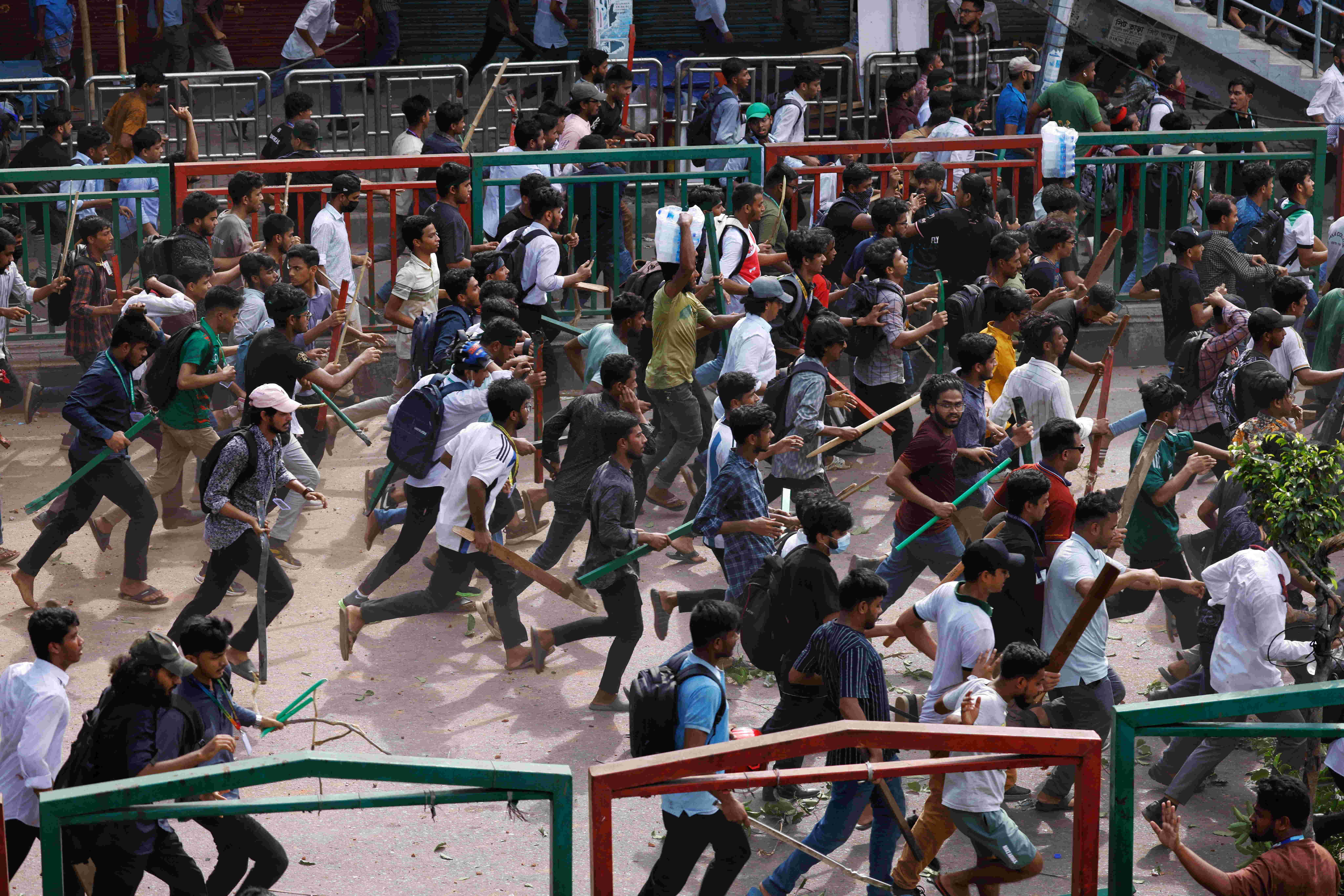Bangladesh’s interim government, led by Muhammad Yunus, has launched ambitious media reforms to undo the legacy of Sheikh Hasina’s 15-year rule, which was marked by censorship, media monopolies, and the notorious Digital Security Act. However, despite promises of greater freedom, journalists remain wary, as self-censorship, restrictive laws, and public scepticism continue to cast doubt on genuine change.
Bangladesh, a democratic nation in South Asia, struggles to improve its media freedom. Under former Prime Minister Sheikh Hasina, media censorship, state influence, and legal threats against journalists became increasingly common. After weeks of massive protests across the country, Hasina resigned and fled Bangladesh on August 5, 2024, ending her 15-year rule.
In the political vacuum that followed, Nobel Laureate Professor Muhammad Yunus, a respected economist and vocal critic of Hasina’s Awami League, was appointed Chief Advisor of an interim government. His selection came through a rare consensus between the president, military leaders, and student protest organisers. One of Yunus’s early pledges was to restore media freedom in a country ranked 149 in the World Freedom Index 2025. On November 18, 2024, his administration established the Media Reform Commission to address the deep-rooted problems that had plagued journalism during Hasina’s time in power.
Breaking the Media Monopoly
Media credibility in Bangladesh has eroded over the years, largely due to the concentration of ownership. During Hasina’s tenure, many major media outlets were controlled by a few conglomerates that allegedly used them to curry favour with the government rather than pursue independent journalism.
These media houses were not meant to pursue objective journalism but to add to the quantity of the news they can produce. More news earlier meant more power to influence. And companies would use them to negotiate with the Hasina government.
"Most media – newspapers, TV channels, and online portals – were owned by Hasina loyalists," says Masum Billah, a journalist based in Dhaka.
To tackle this, the Media Reform Commission proposed on March 22, 2025, that large and midsized media organisations transition into publicly listed companies to ensure transparency and accountability.
Jimi Amir, an experienced journalist in Dhaka who is one of the members of the newly formed Media Reform Commission, told Al Jazeera Journalism Review, “In many countries, such cross-ownership practices have already been prohibited. In places where they haven’t, significant public debate has emerged. If similar discussions begin in Bangladesh, it is also possible to put an end to cross-media ownership here.”
The new media reform commission has also called for an independent regulatory body, a “National Media Commission”, to monitor the media sector. This body would be authorised to handle complaints, enforce ethical guidelines and promote transparency in news media operations.
The Digital Security Act was an infamous legacy of Hasina’s government because of its use to intimidate journalists. The act was replaced by a Cyber Security Act which retained the sections that hindered independent journalists.
From Digital Security Act to Cyber Security Ordinance
The Digital Security Act was an infamous legacy of Hasina’s government because of its use to intimidate journalists. The act was replaced by a Cyber Security Act which retained the sections that hindered independent journalists. The new Yunus government has announced it will repeal nine sections of the law which were said to be a threat to journalists and pass a new Cyber Security ordinance.
Mahfuz Anam, editor of the leading newspaper, The Daily Star, and a prominent figure in the country’s journalism sector, feels that is not enough. “There is enough scope in the present Cyber Security Ordinance to be used against independent media. Therefore, the Editors’ Council – the only independent body representing free media – has opposed it. "We do not feel comfortable at all," he explains. Anam also shares that, in his experience, the governments usually interpret existing laws only to curtail or oppress independent media.
Jimi Amir speaks on similar lines and says that the provisions that have raised concerns among journalists, activists and legal experts should be addressed.
“We have clearly stated our opinion on this matter in the Media Commission's report: that any active or professional journalist can't be harassed without any specific causes,” she adds.
Journalist Protection, Better Pay, and a Unified Media Commission
In the first week of January 2025, the interim government held a groundbreaking initiative called “The National Media Opinion Survey”. Conducted by by the Bangladesh Bureau of Statistics (BBS), it polled over 45,000 families across all 64 districts. Nearly half (47.22%) of respondents said they believed journalists couldn't report freely.
In response, a new “Journalist Protection Law” is reportedly under review. It aims to provide legal safeguards for journalists and news media outlets to allow them to perform their duties without fear of retaliation or intimidation.
Additionally, an independent "Bangladesh Media Commission" will be created to replace the Press Council and a Broadcasting Commission. This new body would oversee all forms of media under one roof.
On the issue of journalist pay, the commission recommended aligning entry-level journalist salaries with those of Class 1 officers in the Bangladesh Civil Service. A “Dhaka allowance” has also been proposed, along with a rule mandating that journalists outside the capital be promoted to staff correspondent after three years.
However, not everyone agrees.
“The proposed salary structure is too ambitious,” says Mahfuz Anam. “Independent media houses that rely on their own revenue simply can’t afford it. Until the digital and social media landscape stabilizes, salaries should be determined by market forces.”
Years of repression under Hasina instilled a culture of self-censorship in Bangladesh’s media. That habit has proven hard to shake, even after her departure.
The Lingering Shadow of Self-Censorship
Years of repression under Hasina instilled a culture of self-censorship in Bangladesh’s media. That habit has proven hard to shake, even after her departure.
“We avoided many stories, not because we didn’t have them, but because we feared becoming victims of enforced disappearance,” says Billah.
But while new reforms are underway, challenges remains a tricky ground for journalists. The Committee to Protect Journalists has voiced alarm over the proposed Cyber Protection Ordinance 2025 and Personal Data Protection Ordinance 2025 – giving the government “unchecked powers” to access personal data.
Emran Emon, another Bangladeshi journalist, shared that he felt a huge impact in his work in the present Yunus regime. “The reality is such that even neutral reporting on the recently ousted political party has become unacceptable,” Emon adds, who also has his reservations on the new media reform commission and says, “There is no visible result” of it.
To make sure words are brought into action, Jimi Amir clarifies that a committee has been formed based on the recommendations of the Media Reform Commission, which specifically looks into the implementation of the Commission’s recommendations. “We remain hopeful that the government is still sincere about implementing this report,” she adds.











































